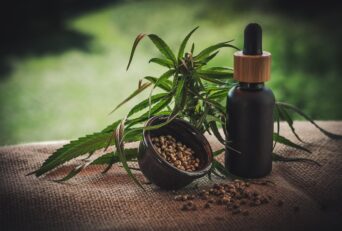Adiponectin is a protein, present in our body that is encoded by the ADIPOQ gene. It is basically involved in regulating glucose levels and also fatty acid breakdown.
Did you know that several different types of hormones fill your body and affect it in many different ways? Your metabolism, moods, and growth depend on such hormones. Adiponectin is one amongst them. Also known as a fat-burning hormone, it allows our body to lose naturally weight.
Adiponectin is a protein hormone, which modulates a few metabolic processes, such as glucose regulation and oxidation of fatty acids.
Adiponectin is secreted primarily from the adipose tissue (also from the placenta while pregnant) in the bloodstream, and it is very greatly abundant in plasma than other hormones.
Levels of the secreted hormone are inversely related to the percentage of body fat in adults; however, a meta-analysis was unable to confirm this association in healthy adults. The association in infant and young children is also quite unclear.
Similarly, circulating Adiponectin concentration increases during caloric restriction in animals and humans, as in patients having anorexia nervosa.
This observation was surprising, knowing that the adipose tissue produces adiponectin.
However, one recent study suggests that adipose tissue within the bone marrow that increases during caloric restriction contributed to the elevated circulating adiponectin in this context.
Table of Contents
Why Is Adiponectin Important?
If your weight is affecting you in a negative way, then you better read this information. Learn what adiponectin is and what role it has to play in your weight loss.
Find out how can you effectively increase levels of this fat-burning hormone in natural ways and learn what foods should be eaten to make adiponectin work for you.
The main question running in your mind might be why adiponectin is so important?
Adiponectin hormone plays the main role in conditions like:
- Weight gain
- Atherosclerosis and
- Type 2 diabetes.
Adiponectin can be your next big and secret weight-loss weapon. Why?
Because this protein-based hormone not only boosts your metabolism but also enhances the ability of your muscles to use the Carbohydrates for energy and increases the rate by which your body breaks down fat.
How To Increase Adiponectin Naturally ?
To make the fat-burning adiponectin hormone to do its function effectively, you must try to live a healthy lifestyle. Eat properly. Stick to the foods high in proteins and amino acids. Exercise regularly and get enough sleep every night.
How much sleep is enough sleep?
For healthy adults 7-9 hour sleep, everyday i.e. in every 24 hours is considered enough sleep. Increasing adiponectin proteins are most important for those people who target to lose weight.
Change your lifestyle and quit smoking. Try and eat whole-grain bread, fruits, fish, vegetables, and other foods with increased concentration of omega-3 acids.
All these diets can increase adiponectin proteins ultimately helping in reducing fat production.
Keep in mind that higher levels of this fat-loss hormone are associated with:
- Higher calorie burning
- Increased insulin sensitivity
- Curbing appetite
- Increasing muscle efficiency
To precisely understand adiponectin, you first need to understand its relation to several things.
1. Adiponectin And Obesity
Obese or highly fat people have lower levels of adiponectin in the blood than normal weight individuals. Further, if you reduce obesity, it will increase adiponectin levels in your body.
Overall, it is clearly sure that losing weight through any forms of diet, exercise, medications, and surgery will consequently increase adiponectin levels in the blood.
Low adiponectin levels are very strongly associated with the quantity of visceral fat than that of subcutaneous fat.
Development of subcutaneous fat is a process that is mainly active process during infant years, adolescence and pregnancy.
In mid-aged and elderly people, overtake of nutrition will not lead to the effective storage of energy in the form of subcutaneous fat. Instead, the accumulation of visceral fat becomes more common.
Lifestyle factors like overeating and/or staying physically inactive in younger years and middle-age appeared to increase the risk of visceral obesity. Dysfunction of the adipose cells is more common in the visceral fat tissue than the subcutaneous fat tissue.
Such dysfunction may likely cause unbalance in the production of adipokines leading to the overproduction of the offensive adipokines and underproduction of the defensive adipokines like adiponectin.
2. Adiponectin And Insulin Resistance/Type 2 Diabetes
The condition of Obesity is in relation with a high occurrence of insulin resistance and type 2 diabetes. Several clinical studies showed that low production of adiponectin is correlated with the development of insulin resistance and type-2 diabetes.
Adiponectin appeared to promote an insulin-sensitizing effect. It has been suggested to down-regulation of the adiponectin could be a mechanism wherein obesity might relate to insulin resistance and diabetes.
Thus, theoretically, increasing the amount or quantity of adiponectin levels might reverse the insulin resistance thereby decreasing the risks of getting diabetes.
3. Adiponectin And Lipid Abnormalities
Highly elevated levels of triglycerides and lower levels of HDL cholesterol are more commonly found in people having obesity or metabolic syndrome.
High triglyceride/HDL cholesterol ratio is associated with increasing the risk of cardiovascular diseases. Adiponectin levels positively correlate with HDL-cholesterol and negatively with triglycerides.
Experimental studies have shown that adiponectin promotes the synthesis of HDL cholesterol. Therefore, lower levels of adiponectin might be important for some of the lipid abnormalities associated with obesity.
4. Adiponectin And NAFLD
Non-Alcohol Fatty Liver Disease (NAFLD) is very common among obese people. It increases the risks of liver cirrhosis and liver cancer.
NAFLD has been associated with lower levels of adiponectin in studies. Low levels of adiponectin correlate with severe fat accumulation in the liver.
5. Adiponectin And Cancer
Obesity is related to increasing the risk of cancer. Several studies showed that adiponectin might play a role in the growth of cancer.
Lower plasma levels of adiponectin have been linked to certain types of breast cancer, endometrial cancer, colorectal and prostate cancer.
It is unknown whether the deficiency of adiponectin plays a role when it comes to the risk of having cancer. Further, it is also not shown that increasing adiponectin levels could reduce the risk of cancer development.
6. Adiponectin And Coronary Artery Disease
Various studies suggested that reduced levels of adiponectin are related with a higher prevalence of coronary artery disease as well as higher risks of heart attacks.
They also suggested that lower levels of adiponectin may predict future coronary events.
Studies on animals showed that adiponectin administration might protect the heart muscles from injury and loss of blood.
7. Adiponectin As A Therapeutic Target
The favorable effects of adiponectin may be increased by injection or using treatments that increase its plasma levels.
Manufactured adiponectin has been administered by infusing it in animal studies. However, molecular complexities of adiponectin have made its production use as a therapeutic agent a little difficult.
Scientists are parallel in search, looking at agents that could enhance the secretion of adiponectin from the adipose tissue or mimic adiponectin effects on receptors of it.
Studies also found that nutraceutical compounds like fish oil, safflower oil, grape-seed extract, conjugated linoleic acid, green tea extract, taurine, and resveratrol are probably to elevate plasma levels of adiponectin.
Recently, phenolic compounds like raspberry ketones are being marketed for weight loss. One of the proposed mechanisms of their action is to raise adiponectin levels. However, there is not a clinical evidence for such an effect in humans.
Foods That Naturally Increase Adiponectin
Is it possible to make my fat cells to start working for me instead of against me? Possible!
Even if adiponectin is made by your own fat cells, it actually helps you in losing fat by perfecting the process in which your body processes insulin and glucose from the foods you consume. There are foods that can help you in keeping your adiponectin levels up, so as to keep your weight down.
The foods are:
1. Avocados
Avocados are one of the tastiest fats to eat. Having great amounts of potassium, folate, and magnesium, also found to be rich in monosaturated fats.
Some similar fruits and even some and others will surely help increase your adiponectin levels. Take benefits of avocados as the tasty fats that they are, effectively act on your belly fats and help in reducing it.
2. Olive Oil
Polyphenols from the olive oil help your body secrete adiponectin that will help to burn more belly fat as well as regulate the metabolism of fats and sugar.Top your salads with olive oil to lose weight in a more productive manner.
3. Pumpkins
Whether you like pumpkins or pumpkin seeds – both of these are perfect sources for increasing adiponectin levels in the body.
4. Chocolate
Surprised? This tasty treat – which is known most famously for making you fat – also stimulates the proteins that kill your fat.
However, there is a little secret. You should have dark chocolate. Only this type of chocolate will stimulate adiponectin.
5. Peanuts
Of course! It is not a low-calorie However, it is beneficial during weight loss. Packed tightly with nutrients and proteins, peanuts help in burning the extra calories in the body.
What’s more? They increase levels of adiponectin. Therefore, weight-loss diets including peanuts are often found to be more efficient than those diets which exclude them.
6. Fish Oil
Not everyone might be okay with eating this. However, it contains beneficial high-quality omega-3 acids that can raise the adiponectin levels of your body. Try considering fish oils as part of your daily routine.
Try considering fish oils as part of your daily routine.If your focus is really on raising adiponectin in your body, then consuming fish oil might be the best option.
7. Coffee
Don’t kick you drinking coffee Regular consumption of coffee will lead to an eventual increase in adiponectin levels. When it comes to boosting the adiponectin levels, coffee is even more successful than green tea.
It is recommended to choose the organic, natural, and fair trade coffee. For better results, start to enjoy a cup of coffee early in the morning.
8. Sprinkle Some Turmeric
Turmeric (aka curcumin) helps fight inflammation, which, at high levels, gives into weight gain. Also working at the fat-cell level, it increases adiponectin production, improving insulin sensitivity of your body.
It does this work by reducing the hormones in your fat cells, which cause inflammation (resistin and leptin primarily) and boosts adiponectin, which will help control the appetite.
9. Reduce Your Belt Size With Safflower Oil
Research done by Ohio State University showed that 1½ tablespoon(s) of safflower oil, which is high in an omega-6 compound known as Linolenic acid, consumed once a day can lower cholesterol, balance the blood sugar levels and reduce the trunk fat in post-menopause women by virtue of the positive effects of it on adiponectin levels
In the study, 16 weeks of supplementation of this super-oil also gave another unanticipated side effect increase in muscle tissue.
As a bonus, you might add a little safflower oil to your conditioner also, to moisturize your hair and nourish your hair follicles.
The better news is that there are a few really working things you can do to increase adiponectin fat-burning hormone levels naturally.
Follow to know how is how:
10. Do Exercises
The more you do the movement, the higher the fat-burning hormone levels go. Become consistent in your daily exercises to reach success. Regular exercising activity is beneficial to those who are fat.
Why? Because adiponectin is a product created by fat cells. It means that the fatter a person will be the more adiponectin is created through exercises.
11. Consume Monounsaturated Fats
To raise the adiponectin levels, replace saturated fats in your consumption with monounsaturated fats. These can be easily found in olive oil, groundnuts, sesame oil, and avocados; above-mentioned products including lean beef.
Decrease the amount of consumed alcohol, sweetness (sugar), processed foods and try to consume healthy and fat-burning foods to start shedding those unwanted pounds attached to your belly.
Adding monounsaturated fats, green vegetables and fruits to your meals will help increase adiponectin levels effectively and decrease your waist size.
12. Mediterranean-Style Diet
Healthy eating habits and weight loss accompanying it may help raise lower circulation of adiponectin levels.
Studies have suggested that a Mediterranean-style diet, which is rich in whole grains, fruits and nuts, and vegetables and low in apparently saturated fats and simple sugars might be particularly effective.
For example, blood levels of adiponectin were 23% higher in women having diabetes who closely adhered to the Mediterranean diet, compared to women who less adhered to such type of diet.
13. Dietary Fibre
Foods that are found rich in dietary fiber tend to have a lower glycemic index-a measure for food’s propensity of raising blood glucose after having it.
Diets containing whole-grain foods instead of refined-grain foods are associated with higher adiponectin levels in both the men as well as the women with diabetes.
The relationship between fiber intake and adiponectin levels may hold the truth in people even without diabetes as well.
A study from the June 2008 issue of the “Metabolism” found that higher intakes of whole-grain cereals and lower intake of refined grains produced higher levels of adiponectin in women living in Mediterranean region who were healthy.
14. Unleash The Yoga Mat
As we age, our risk of resisting insulin increases. We’re more prone to accumulation of belly fat and reduced leaning muscle mass, which leaves us eventually burning fewer calories than we could in our more youthful days.
The more the fat tissues you have, the lower will be your adiponectin levels, which helps the cycle of insulin resistance and belly fat.
The good news is that yoga has proved to reverse this process in the post-menopausal women. Researchers found out that yoga improved adiponectin, relative cholesterol levels, as well as metabolic syndrome risk factors.
Researchers found out that yoga improved adiponectin, relative cholesterol levels, as well as metabolic syndrome risk factors.
Bottom Line
Adiponectin is the solution to your fat/ obesity problems. Increase its levels and you are going to be gifted with a perfectly shaped body.
Try to have the food items described as a part of your daily intake, and adiponectin levels will all be under your control.
However, do take a precaution as not to run behind controlling adiponectin overlooking harmful effects of some items.
At last, it is always the best to consult a real professional if you want to control adiponectin levels and achieve a perfectly toned body.






